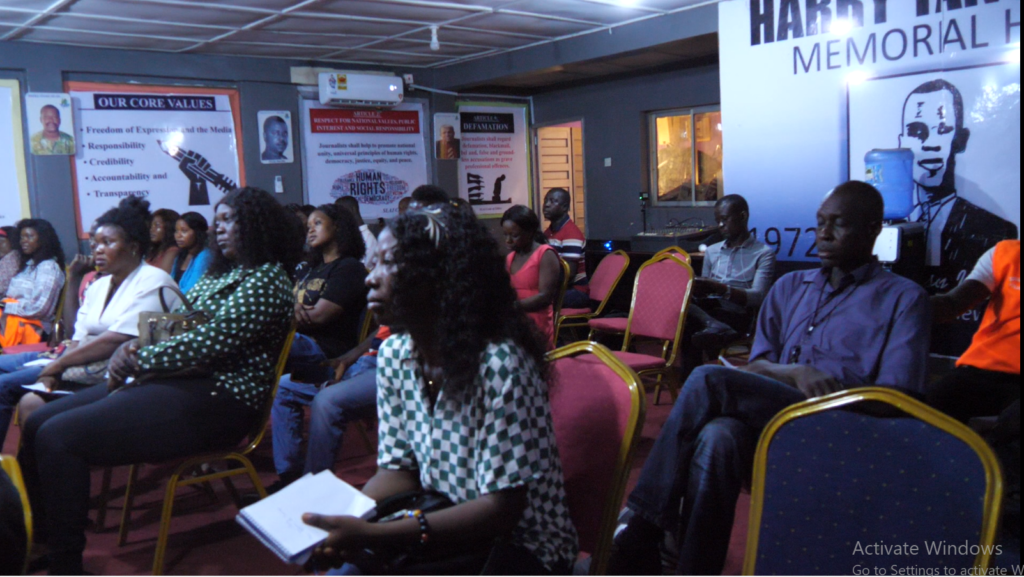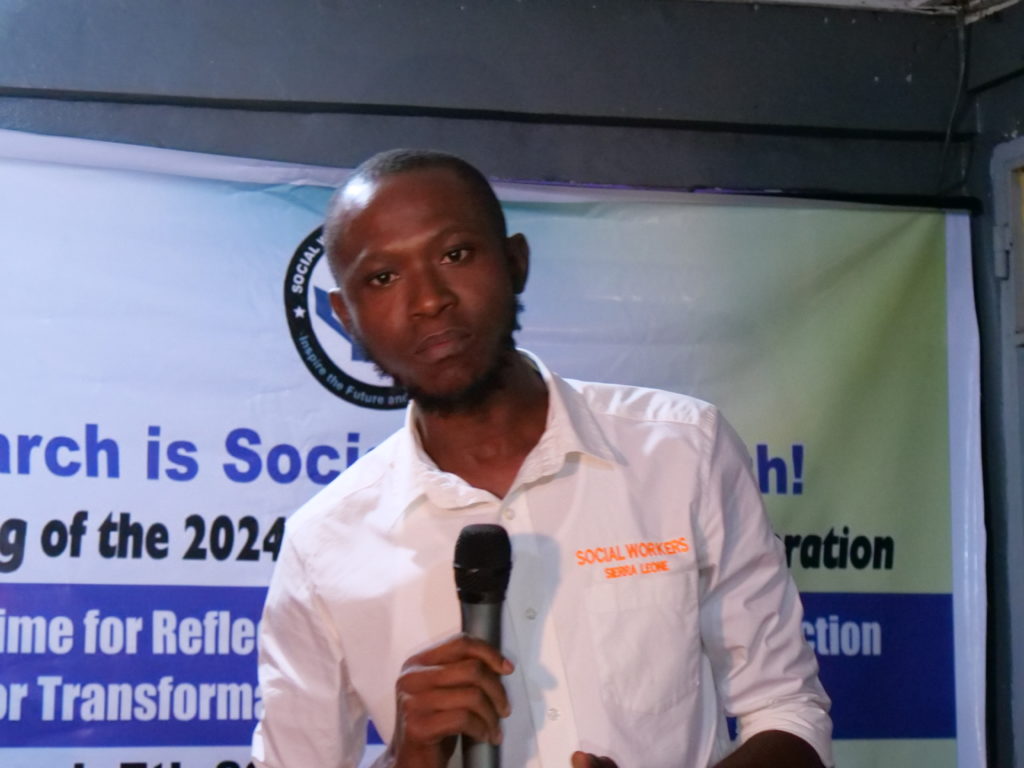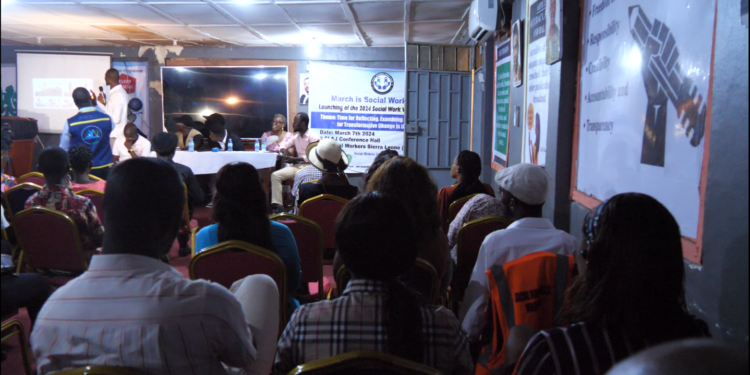By Alfred Taylor
Social Workers Sierra Leone (SWSL) on Thursday, March 7th launched weeklong activities as part of commemoration of the 2024 Social Work Month amid appeals for official recognition of the profession.
March is widely considered as Social Work Month, during which practitioners reflect on the profession and celebrate the dedication, sacrifices and achievements of social workers.
The global theme for this year’s commemoration is “Empowering Social Workers,” which Sierra Leonean social workers say speak to their plight, serving in a country where their services don’t seem appreciated.

SWSL is a group of volunteer social workers who provide social work services to vulnerable individuals and communities across Sierra Leone. Its Founder and National Coordinator, Hassan Koroma, described the lack of recognition demonstrated by the continuous absence of an Act regulating the profession as a “very serious” matter.
Koroma said that as social workers, they find it difficult to call themselves such while operating in an environment where the profession is virtually illegitimate.
“We want to use this humble gathering to call on government to take this bold step through the ministry of Social Welfare, to see the need and the relevance to acknowledge social work through a statutory Act that can give us the respect and honor, so that we can be able to practice in a more dignified manner,” he said.
The event held at the conference hall of the Sierra Leone Association of Journalists (SLAJ) headquarters in Freetown brought together volunteer and student social workers, seasoned practitioners, as well as representatives of partner organizations of SWSL.
Founded in 2012, SWSL has become a household name for its intervention over the last decade serving neglected segments of society, particularly the homeless and mentally ill people.
In a presentation, Koroma highlighted how SWSL has evolved from a small a organization to one that has played crucial role in national response efforts during the darkest days in the country, notably the 2014-2016 West African Ebola epidemic and the Covid-19 pandemic.
The volunteer social work organization has also responded to natural disasters like the deadly 2017 mudslide in Freetown, which claimed about 1000 lives and left hundreds of people homeless, as well as recurrent flooding.
In all of these events, SWSL volunteers provided psychosocial support to the surviving victims. In some cases, they also provided relief services.
But observers say despite their crucial role of social workers, the Sierra Leonean society doesn’t seem to appreciate the importance of the profession.
According to Koroma, lack of recognition for the profession is demonstrated in the sidelining of social workers during recruitment into the civil service.
“Our nation needs social workers more than ever,” Koroma stated.
“If we want to continue to have a productive and healthy population, social workers need to be factored in healthcare, in education, and so many other areas where they are relevant,” he added.
SWSL looks up to with the two main international umbrella social work organizations- IFSW and NASW – each of which coined their own themes.

The theme for IFSW is: “Shared future for a transformative change,” while NASW’s theme is “Empowering social workers.”
From these two SWSL coined its own theme: “A time for reflection, examination and action for a transformative change for the profession.”
“Both themes speak to the current reality that we face in the social work profession,” said Koroma.
Over the years, SWSL has worked in collaboration with local and international partners. One of such partners is the LemonAid Fund, a US-based charity that supports individuals in their efforts to achieve positive and lasting change in the lives of their children, families and communities.
Veteran social worker and representative of LemonAid Fund in Sierra Leone, Frances Brown, spoke about the sacrifices of social workers in efforts to change society for the better, noting that they summon the human spirit to his/her best self.
“We can look at people from zero and find a way to use the psychology that we know to change them,” she said.
“Social workers deny themselves to help others,” she added, urging the younger generation of practitioners to not just endeavour to keep this legacy, but to use it to make the required change in society.
Also speaking at the event were representatives of learning institutions providing tuition on social work. Idrissa Kamara from the Department of sociology and social work at the Fourah Bay College, University of Sierra Leone, said empowerment lies at the heart of social work education, which he believes is crucial in making students agents of change in their communities.
“In the face of seemingly unsurmountable obstacles, social workers draw inspirations from the resilience and strength of the people they serve,” Kamara said, adding: “In a world plagued by systemic injustice, inequality and oppression, social workers are called upon to be catalysts for change. Educational institutions must prepare students to lead this change by instilling in them a commitment to social justice, a willingness to challenge the status quo, and the skills to advocate for policy reforms.”
This is the 10th time Sierra Leone is celebrating the Social Work Month, and SWSL was the pioneer of this venture.
As always, the organization has a line-up of activities it intends to undertake within the week. These include media engagement popularizing the role of social workers and conducting Forgiveness, Gratitude and Appreciation (FGA) sessions specifically targeting drug users. Some 30 social workers have already been trained by SWSL as part of the first week of activities.
For a successful implementation of their activities in the remaining weeks, the organization is appealing for support from line ministries, particularly the Ministries of Social Welfare and Health.
Musa Amara, a senior social work volunteer, cited issues they face trying to provide services to their clients, which he said the relevant authorities can help address. These include facilitating access to referral forms for their clients.
“We have been working with people experiencing homelessness for more than five years, and one of the things we normally do is try to seek medical assistance for them. But when we do referrals, regardless of the fact that as par the Disability Rights (Act) there are some provisions for some medical support, it is still difficult…,” he explained.
“Our expectation is that more of our sisters and brothers that are indulged in this [drug use] are accepted and, if possible quit, and for those who need medical attention are able to access it,” he added.






















